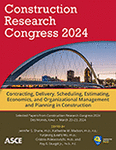Identifying Key Modularization Decision Factors in Industrial Projects
Publication: Construction Research Congress 2024
ABSTRACT
Modularization, a strategy of transferring some or all site-based work to external locations, has the potential to improve project competitiveness with cost and schedule advantages. While much previous research on modularization has primarily focused on the building sectors, many heavy industrial projects have yet to fully realize the benefits of modularization due to poor and late decisions. To address this issue, this research identifies the critical decision factors for implementing modularization in industrial projects. Utilizing the expertise of the Construction Industry Institute Research Team 396, the researchers identified the decision factors for modularization based on their importance in the industrial sector after thoroughly examining existing business cases/decision models from world-leading global companies and literature. A survey questionnaire was prepared and distributed to the subject matter experts, asking them to rank the importance of decision factors. The result indicated that the top 10 key decision factors for modularization in industrial projects were site location, site attributes, site access, labor costs, cost savings, owners’ ability, logistical constraints, maximum module size, labor availability, and site infrastructure. The study guides the practitioners seeking to maximize the benefits of modularization in heavy industrial projects.
Get full access to this article
View all available purchase options and get full access to this chapter.
REFERENCES
Altaf, M. S., Bouferguene, A., Liu, H., Al-Hussein, M., and Yu, H. (2018). “Integrated production planning and control system for a panelized home prefabrication facility using simulation and RFID.” Autom. Constr., 85, 369–383. https://doi.org/10.1016/j.autcon.2017.09.009.
Choi, J. O. (2014). Links between Modularization Critical Success Factors and Project Performance, Ph.D. Dissertation. Austin (TX): The University of Texas at Austin. https://repositories.lib.utexas.edu/handle/2152/25030.
Choi, J. O., O’Connor, J. T., Kwak, H., and Shrestha, B. K. (2019). “Modularization Business Case Analysis Model for Industrial Projects.” J. Manage. Eng., 35(3). https://doi.org/10.1061/(ASCE)me.1943-5479.0000683.
CII (Construction Industry Institute). (2021). Retrieved May 10, 2023, from https://www.construction-institute.org/groups/research-teams/rt-396.
CII MCBA (Construction Industry Institute - Modularization Community for Business Advancement). (2023). Retrieved May 13, 2023, from https://www.construction-institute.org/groups/communities-for-business-advancement/modularization.
Duncheva, T., and Bradley, F. F. (2019). “Multifaceted Productivity Comparison of Off-Site Timber Manufacturing Strategies in Mainland Europe and the United Kingdom.” J. Constr. Eng. Manage., 145(8). https://doi.org/10.1061/(ASCE)co.1943-7862.0001641.
Enshassi, M. S. A., Walbridge, S., West, J. S., and Haas, C. T. (2019). “Integrated Risk Management Framework for Tolerance-Based Mitigation Strategy Decision Support in Modular Construction Projects.” J.Manage.Eng.,35(4). https://doi.org/10.1061/(ASCE)ME.1943-5479.0000698.
Gan, X. L., Chang, R. D., Langston, C., and Wen, T. (2019). “Exploring the interactions among factors impeding the diffusion of prefabricated building technologies: Fuzzy cognitive maps.” Engineering, Construction and Architectural Management., 26(3):535–553. https://doi.org/10.1108/ECAM-05-2018-0198.
Hwang, B. G., Shan, M., and Looi, K. Y. (2018). “Knowledge-based decision support system for prefabricated prefinished volumetric construction.” Autom. Constr., 94:168–178. https://doi.org/10.1016/j.autcon.2018.06.016.
Khalili, A., and Chua, D. K. H. (2013). “IFC-Based Framework to Move beyond Individual Building Elements toward Configuring a Higher Level of Prefabrication.” J. Comput. Civ. Eng., 27(3), 243–253. https://doi.org/10.1061/(ASCE)CP.1943-5487.0000203.
Kluck, M., and Choi, J. O. (2023). Modularization: The Fine Art of Offsite Preassembly for Capital Projects. John Wiley & Sons. First Ed.
Larsson, J., Eriksson, P. E., Olofsson, T., and Simonsson, P. (2014). “Industrialized construction in the Swedish infrastructure sector: Core elements and barriers.” Construct. Manage. Econ., 32(1–2), 83–96. https://doi.org/10.1080/01446193.2013.833666.
Lee, J., and Hyun, H. (2019). “Multiple Modular Building Construction Project Scheduling Using Genetic Algorithms.” J. Constr. Eng. Manage., 145(1). https://doi.org/10.1061/(ASCE)co.1943-7862.0001585.
Liu, G., Nzige, J. H., and Li, K. (2019). “Trending topics and themes in offsite construction (OSC) research The application of topic modelling.” Constr. Innovation.,19(3):343–366. https://doi.org/10.1108/CI-03-2018-0013.
Nabi, M. A., and El-adaway, I. H. (2020). “Modular Construction: Determining Decision-Making Factors and Future Research Needs.” J. Manage. Eng., 36(6). https://doi.org/10.1061/(ASCE)me.1943-5479.0000859.
O’Connor, J. T., O’Brien, W. J., and Choi, J. O. (2014). Critical success factors and enablers for optimum and maximum industrial modularization. J. Constr. Eng. Manage., 140(6), 04014012. https://doi.org/10.1061/(ASCE)CO.1943-7862.000084.
O’Connor, J. T., O’Brien, W. J., and Choi, J. O. (2015). Industrial Project Execution Planning: Modularization versus Stick-Built. Practice Periodical on Structural Design and Construction., 21(1), 04015014. https://doi.org/10.1061/(ASCE)SC.1943-5576.000027.
Wuni, I. Y., and Shen, G. Q. P. (2019). “Holistic review and conceptual framework for the drivers of offsite construction: A total interpretive structural modelling approach.” Buildings 2019, 9(5):117. https://doi.org/10.3390/buildings9050117.
Yunus, R., and Yang, J. (2012). “Critical sustainability factors in industrialized building systems.” Constr. Innov., 12 (4): 447–463. Emerald Group Publishing Limited. https://doi.org/10.1108/14714171211272216/FULL/PDF.
Information & Authors
Information
Published In
History
Published online: Mar 18, 2024
Authors
Metrics & Citations
Metrics
Citations
Download citation
If you have the appropriate software installed, you can download article citation data to the citation manager of your choice. Simply select your manager software from the list below and click Download.
